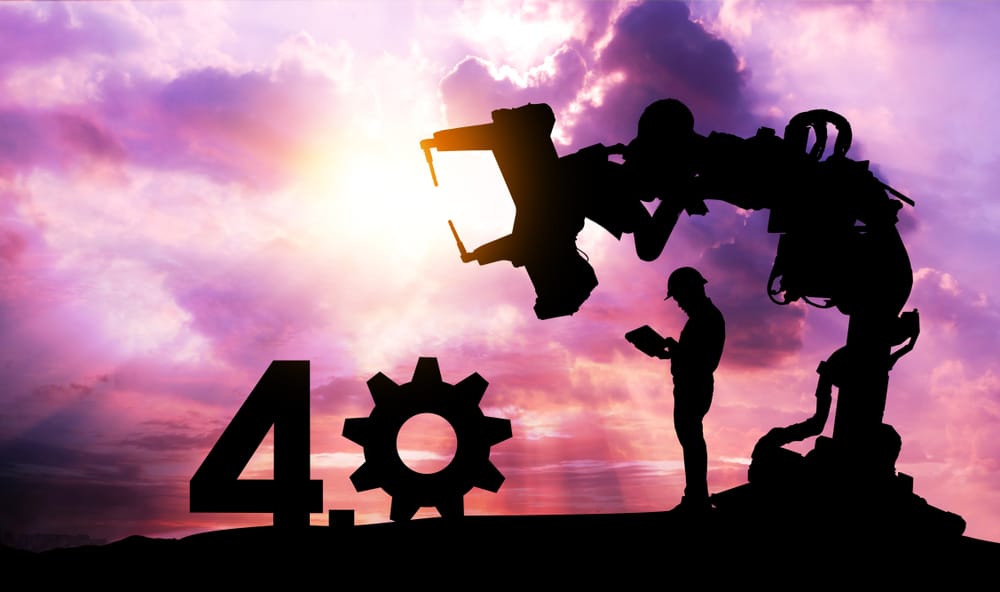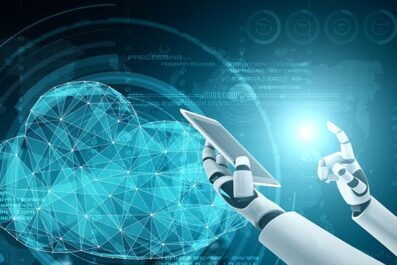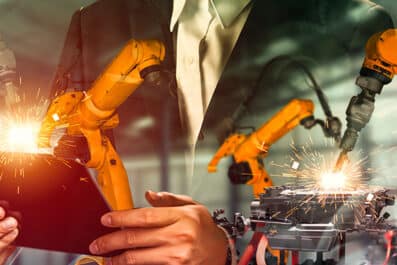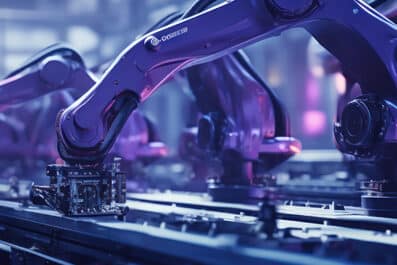Digital Transformation for a Multi-functional Manufacturing Industry
The constantly revolutionizing world is now transforming the manufacturing sector as well with the help of digital transformation consulting services. With Industry 4.0 in view, several manufacturing brands are taking a leap forward from traditional automation to a completely connected and flexible system by implementing digital transformation in manufacturing Industry.
 5 Mins Read
5 Mins Read 
Manufacturing today is at a better place due to a complete transformation of traditional legacy systems to smart systems, leading the industry towards a digital future of advanced automation, however, the question that arises here is how smart factories and automated manufacturing operations will enable the industry to compete and grow at the same time?
Introduction
There’s a rapid increase in consumer demand, leading to high supply and competition in the manufacturing sector. Looking at the current industry’s scenario, the manufacturing organizations are taking a step towards the digital world hoping to transform their traditional working system into a smart automated system, reducing the total cost, time, effort, manpower, and human errors. Although the transformation isn’t at a rapid pace, we can see a noticeable difference in the industry when it comes to digital transformation in manufacturing Industry means automation and switching the old legacy systems leading the sector towards Industry 4.0 revolution.
Lately, the manufacturing industry has been facing some issues pertaining to the digital transformation of legacy systems, analyzing humongous data, and recognizing recurring faults and errors in daily operations. Let’s discuss this in the next section.
Complications and Challenges Faced by the Manufacturing Industry
- While the manufacturing industry has grown over the years, it won’t be wrong to say that the industry is facing a few challenges leading to the emergence of the fourth revolution of the manufacturing industry.
- Periodic data analysis is an issue to think about. No mechanism can proffer the production details of every machine and device in the factory.
- Difficulty in integrating multiple systems leaving a gap in communication and coordination leads to a delayed process.
- Keeping a track of assets, machinery, and daily operations manually is a time-consuming process, leading to the requirement of additional manpower.
- Maintaining attendance and keeping a track of employees without Employee management software is a huge task that requires additional cost and manpower.
- Already incorporated legacy systems pose additional challenges pertaining to an increase in cost, time, effort, manpower, maintenance, and limited fault detection.
- Analyzing the legacy systems is a back-breaking task due to its complex fault detection technique and maintenance procedure.
Digital transformation of the manufacturing industry will give MSEs a boost to compete with big giants in the ever-growing industry and it can be archive with the help of digital transformation consulting services. With digital transformation in industries, manufacturers can easily track their everyday growth and accurately plan future steps to move forward without investing too much in planning and manpower.
Digital Transformation of the Manufacturing Industry
Digital transformation in industries means switching a business’s manual process to an automated process via data analysis and insights. Internet of Things, cloud computing, big data analysis, Machine learning, Digital marketing and Artificial Intelligence aid manufacturers to make the right decisions at the right time without losing time, human effort, and infinite money.
It enables the convergence of information technology with operation technology, creating a cyber-physical environment. It’s allowing manufacturers to move ahead in the world of digitization and automated solutions for the operational procedures to transform into virtual reality. Industry 4.0 entails intelligence, flexible automation, and connectivity that overall explains what the manufacturing industry is looking for, for making manufacturing operations seamless.
Transform Your Traditional Legacy Systems to Smart Systems, With Us
Industry 4.0 enables manufacturers today to go digital and analyze data that at first seemed to be a dream. Let’s know what are its key components.
Machine Manufacturing Industry’s Digital Transformation Trends
Now that you are familiar with Industry 4.0, it’s time to know what it entails.
System Integration
Highly automated technology is generally difficult to integrate with other software or systems. Open architecture enables the manufacturing system to seamlessly transfer information from one software to another.
Industrial Internet of Things (IIoT)
The Internet of Things is the heart of Industry 4.0. IoT is a promising tech trend that facilitates the manufacturing industry’s ease in managing operations, security, logistics, assets, and much more. Manufacturers around the world have successfully integrated IoT into their infrastructure, resulting in reduced expenditures, control delivery time, and improved production procedures.
Manufacturers are scaling up their business by investing in equipment that is efficient in distant observing and servicing. This helps the manufacturers to comprehend the needs of the customers and producers alike.
Many manufacturers are making use of IoT by utilizing a Connected control system for effective supervision and procession. The connected controlled system ensures manufacturers reduced delay time in production, a better understanding of machinery and operational faults, and efficiently manage the workers, enhance their skillfulness and transform the working environment safer for them.
Cloud Computing
With the advent of IoT and Industry 4.0, many manufacturing companies are frustrated with the huge amount of data flooding in, particularly when they do not have enough storage space. This is where cloud computing comes into the picture.
Cloud computing enables businesses and manufacturers to store and process data on remote servers without having to build an in-house storage infrastructure. The data on the cloud can be accessed from anywhere and anytime, without having to return to the same desktop or laptop again.
Although cloud computing is not a stand-alone solution, it aids in implementing other solutions for digitizing one’s operations. On the cloud, you can store and access a hefty amount of data and enable software to analyze it for further support.
Machine Learning
We have to accept that machines today are proving to be more efficient than humans when it comes to multitasking and maintaining quality. Manufacturers today are depending on machine algorithms for quick analyses to rectify machine-related errors and enhance their performance.
Machine learning aids in enhancing your firm’s value by improving the logistic processes, chain and supply management, inventory management, HR and employee management, and much more. Software is integrated with machine learning for companies to track assets, maintain inventory, and optimize accuracy.
Machines can effortlessly turn around the data to analyze and anticipate further risks, and options to implement. In addition, machines can provide better insights for all operations.
Augmented and Virtual reality
The manufacturing industry can seamlessly integrate virtual and augmented reality to reinforce zero defects, improve training via training solutions and deliver quality without compromising on time and cost. Training solutions offer excellent training sessions that are well-integrated with augmented reality for the trainee to learn better and aid in the advancement of the industry digitally
Minimize The Risk And Optimized The Profit With Industrial Software Solution, Connect With Us Today
A Few Examples of Digital Transformation in Manufacturing Industry
Every Industry 4.0 component has been a success for manufacturers around the world. The point to keep in mind is that each component has been trusted and applied by top manufacturing firms to finally see it reap the profits it was looking for. Let’s walk through the digital transformation examples in manufacturing.
Automate Manufacturing process via Industrial Internet of Things
It may seem easy but when it comes to managing factories and manufacturing operations from a single point, it turns out to be a nerve-wracking process. Today, multiple manufacturers are suffering due to the lack of communication and connectivity for which manufacturers around the world are turning towards the Internet of Things.
Mahindra & Mahindra Ltd builds around 1 million cars every year. While users are more than happy with their service and products, the pressure is building on the engineering team to fulfill their users’ expectations by delivering the projects on time without any errors or defaults. Streamlining and automating the manufacturing process was a back-breaking task for the engineers. Therefore Mahindra & Mahindra Ltd included the Internet of Things in their everyday manufacturing and supply chain business to get real-time data to understand the defects and errors before time to enhance their machinery performance. Using IoT has helped the brand to adapt faster and be flexible. This has helped the company to reduce human effort and complete the tasks on time.
Streamline Industrial Processes via Cloud Computing
The combination of the Internet of Things and Cloud computing is bringing a digital transformation in industries. Bosch Automotive System Factory in China was facing issues in streamlining its industrial process, leading them towards a digital transformation with the automotive process.
Today, the company uses sensors in the machinery to connect them all to monitor the core of the plant. The sensors enable Bosch to collect data which is later analyzed via a data analytics tool to give an overview of the machinery.
This has helped Bosch to predict unforeseen equipment failures and reduce human effort. The data saved on the cloud now enables the company to view detailed information and get rid of redundant errors.
Now your Employees will aid in advancing your company’s Performance through Augmented Reality
General Electrics is a Jet Engine manufacturing company that has successfully incorporated Augmented reality into manufacturing procedures. Prior to using the smart glasses, General Electrics engineers used to put a halt to their work and constantly check the manuals to see if the tasks were performed accurately. This process was time-consuming; however, with smart glasses, General Electric engineers now can finish their work before time and spend the left time improving the quality and performance of the Jets.
According to General Electrics, the augmented and virtual reality increased workers’ productivity by 11%.
Reap the Benefits of Digitally Transforming your Business
Using technology to streamline and automate your manufacturing process helps you maximize your business productivity and profits while giving you an edge over other competitors. Let’s get to know a few more benefits of incorporating digital transformation into your manufacturing company.
- By digitally monitoring and maintaining your machines and manufacturing procedures, you are increasing your company’s productivity while reducing the overall cost.
- By unsubscribing for unscheduled maintenance services, you are reducing the downtime that is associated with sudden maintenance services.
- Digitization enhances your workers’ performance by giving them an opportunity to learn something more, giving you an output that’s better and bigger.
- The transition of legacy systems to smart systems enables the machinery to communicate with other devices and proffer detailed data for analytics. The detailed data allows engineers to better comprehend the system for unforeseen fault detection.
- Cloud integration gives you a chance to procure data and enables user dashboarding for fault detection to minimize downtime and total cost.
- Digitally connected systems proffer better connectivity and the internet of things enables effective communication for better operational procedures.
How can we help?
Today’s manufacturing industry is flourishing due to its digital transformation. Some companies are flying to the next level, while others are still left behind due to the lack of knowledge pertaining to digitization and its benefits.
Stark Digital Media Services a digital transformation consulting firm sets the standard in automation by merging two services and products, and innovative technology. As a digital transformation consulting services provider, we offer services that work together to improve your business’s performance via analytical aspects and reduce downtime to add value to all operations.
Our automation consultants and developers specialize in digitally transforming your manufacturing firm by seamlessly integrating interconnected software and technology that enables you to make decisions at the right time. Our well-experienced developers and consultants offer cost-effective, digitally integrated, and streamlined engineering services. Our responsibility is to digitally transform your daily operations which makes your firm flexible and agile to adopt new technology, keeping you on edge over other competitors.
Conclusion
Every firm needs to evolve with time to stay in the game. With Industry 4.0 rapidly revolutionizing the manufacturing industry, it’s essential for your firm to take advantage of time and evolve digitally at a rapid pace. We as a digital transformation consulting firm enable you to move forward with the right technology in hand and a vision in mind.






